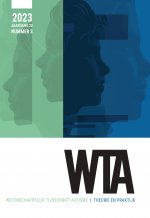
Proefschrift: Dierondersteunde interventie voor volwassenen met autisme
Productgroep WTA 2023-3Omschrijving
Het doel van mijn promotieonderzoek (Wijker, 2022) was om na te gaan of Animal Assisted Therapy (AAT) een positief effect heeft op het zelfinzicht en sociale communicatieve vaardigheden van volwassenen met autisme met een gemiddelde tot hoge intelligentie, waardoor in het dagelijks leven mogelijk minder stress, angst en stemmingsproblemen ervaren worden. De uitkomsten van het onderzoek geven aan dat deelnemers significant minder stress, agorafobie en depressie ervaren na de AAT-interventie, en hun naasten een significante verbetering in sociale responsiviteit rapporteren, zoals sociaal bewustzijn en sociale communicatie. De interventie wordt als zeer uitvoerbaar en relevant beoordeeld door deelnemers en therapeuten en de positieve effecten zijn te generaliseren naar het dagelijkse leven van deelnemers. De AAT kan gezien worden als een veelbelovende therapie voor volwassenen met autisme zonder bijkomende verstandelijke beperking. We raden aan om vervolgonderzoek te doen naar de effectiviteit van AAT en deze therapievorm vaker in te zetten binnen de geestelijke gezondheidszorg waar volwassenen met autisme worden behandeld.
Summary
This article is based on the thesis in which the effects of Animal Assisted Therapy (AAT) were explored on, amongst others, self-perceived stress, anxiety, depression, and social communication in adults with autism and an average to high intelligence (Wijker, 2022). AAT is a structured, goal-oriented intervention in which a trained animal plays an integral role. Participants received 10 weekly one-on-one AAT sessions guided by a certified psychologist. The aim of the AAT was to reduce stress and improve social and communication skills. This research shows that 1) after AAT participants experience significantly lower self-perceived stress, agoraphobia, and depression, and informants of AAT participants report significant improvements in social responsiveness, such as social awareness and social communication, 2) that AAT is rated as highly feasible and relevant by both participants and therapists, and 3) that AAT may be effective in generalizing learned skills to participants’ daily lives. Because of its clinically relevant effects and remarkable adherence, AAT can be regarded as a promising therapy for stress-related outcomes, such as anxiety and depression and social awareness and communication in this population. More research however is needed on the effects of AAT in the ASD population and with larger sample sizes.
